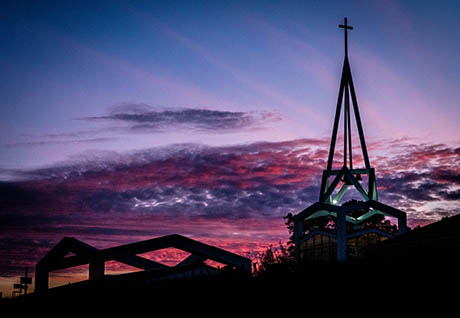The woman was sitting at a booth with two young children. I didn’t think that much about her, but I did notice she looked exhausted and sad. They were sitting near me at a restaurant Tuesday evening when another couple came in and immediately made their way to the woman.
The woman who had just entered reached down and hugged the sad woman. I couldn’t hear all of what they said, but I could hear the couple asking how she’s doing and if there’s anything they could do to help. I pieced together that they go to church together and the first woman’s husband has recently died.
The exchange didn’t last long. The widow seemed grateful for the support, but she clearly didn’t want to talk. The other couple left to order their dinner.
“We just want you to know you’re not alone,” the man said to the widow as they left. “We’re here for you.”
With that one line, I was reminded of the power of a close-knit, loving community — and why that is often found in churches and other religious groups.
I was reminded of an article I read earlier this week by Timothy P. Carney, who has a new book called Alienated America: Why Some Places Thrive While Others Collapse.” Carney outlines research which suggests that those who are active parts of religious communities are healthier and happier than those who don’t.
Carney wasn’t making the case for any particular theological point of view. He was simply pointing out that we humans need community — and those who find it in churches are far more likely to have that than anybody else in this country. He says that “the more religious counties do better, and the least religious counties do worse,” not because of what they believe — but because of the community they find with each other.
This matches my experience. The times I have been happiest and most stable in life were the times when I have been most connected with other people through a church group. I haven’t always liked all the people. I haven’t always agreed with every point of theology in what I heard. But I’ve always felt safe and loved among people who knew me and who allowed me to know them.
I wrote something about this not long ago, so this isn’t a new theme for me. As our culture becomes more nasty and fragmented, we have more need than ever for a place to feel like home — for a community where we’re loved and valued.
For a long time, I took the typical Evangelical attitude toward the primary purpose of a local church. I saw the purpose as “spreading the Gospel.” I’ve changed quite a bit on that point over the years, though, mostly because I see the Gospel of Jesus more through his words now and less through the words of the preachers who shaped my theology as a child.
A church is a place where flawed people build community with one another and try to live as Jesus taught them to live. It’s a place where people grow and become better human beings — by learning how to love in ways that the culture finds strange and out of date today.
We need each other.
We need to grow together. We need to love together. We need to help one another. We need to become more like Jesus — and less like the loud politicians who pretend to speak for him.
That doesn’t mean just going to a Sunday morning service every now and then — or even every week. It means becoming involved in the lives and activities of the people of that community. It means spending time together and knowing their children and their burdens and their joys. It requires an investment of time and trust.
The story of the couple I saw tonight consoling a hurting woman was just a tiny thing. Anybody can console anybody else under the right circumstances, but it was clear that these people had already built community together.
They knew each other. They trusted each other.
We don’t find community in our electronic devices or on Facebook or in our political organizations. Not in the same way. We find loving community in churches and synagogues and mosques among those who are like us and who are seeking what we’re seeking.
We need to quit worrying so much about being right about theology — and more about building close-knit communities with people who love one another and are there for one another, whether times are good or bad.
Note: The photo above is one I shot of First Baptist Church of Hoover, Ala., last month at sunset.

 What does a man confess about himself when he wants a ‘slut’?
What does a man confess about himself when he wants a ‘slut’? Doing the right thing frequently requires breaking immoral laws
Doing the right thing frequently requires breaking immoral laws